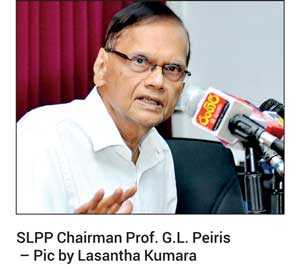Friday Feb 27, 2026
Friday Feb 27, 2026
Tuesday, 5 March 2019 01:33 - - {{hitsCtrl.values.hits}}
By Nuwan Senarathna
The Sri Lanka Podujana Peramuna (SLPP) yesterday called on the Government to take measures to protect the Sri Lankan military at the United Nations Human Rights Council (UNHRC) sessions.
UNHRC sessions began last month and the latest update on Sri Lanka’s reconciliation progress is expected to be presented before the council on 18 March. The Government is expected to respond to the evaluation reports and co-sponsor a resolution with several countries including Britain. 
However, SLPP Chairman Prof. G.L. Peiris said that the measures taken by the Government to defend the military were insufficient and inadequate attention had been paid to highlight the atrocities committed by the Liberation Tamil Tigers of Eelam (LTTE).
“The Government is completely silent. It has to defend the military against accusations of war crimes more aggressively and work to protect the reputation of the Sri Lankan armed forces who worked so hard and made many great sacrifices to bring peace to this country. The Government is siding with those who criticise our military and adopting a policy of calculated silence that is a total abdication of its primary responsibility as the Government,” Prof. G.L Peiris said at the party head office.
He noted the Government’s duty was to represent and defend the county and its people whenever concerns were raised on Sri Lanka at the UNHRC. He argued the Government had totally neglected its obligation when it co-sponsored resolution 30/1 before the UNHRC in 2015.
Prof. Peiris charged that the Government was engaged in a typical “witch hunt” against military personnel, which he insisted was done to improve appearances before the UNHRC. Prof. Peiris also said statements made by Defence Secretary Hemasiri Fernando on 21 January when he said 11 Navy personnel would be prosecuted for abductions of Sinhala and Tamil youth during the war, was an effort to pacify international organisations. According to Prof. Peiris, such statements had raised suspicions that these measures were driven by political agendas targeted at UNHRC sessions.
“The question that arises with these statements is whether the Defence Secretary is overstepping his mandate. It is the Attorney General who should decide on arrests based on evidence, not the Defence Secretary,” he argument. Prof. Peiris charged that the UNHRC had been setting a double standard on alleged war crimes that were reported during that last phase of the 30-year conflict by focusing on shortcomings of the Sri Lankan military but not giving the same emphasis to the LTTE.
“Our primary objection to the UNHRC is its double standards. On one hand, the pressure is being brought to bear on the Government to persecute war heroes, but on the other, Adele Balasingham lives freely even though she was clearly implicated in knowing about child soldier recruitments by the LTTE. There is evidence that she tied the cyanide capsules around the neck of child soldiers. But nothing whatsoever has been done about these things.”
He claimed the UNHRC had failed to take action against the LTTE, even though it had spent years trying to hold the Government accountable.